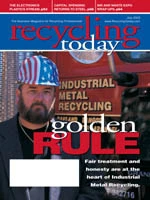There have been a number of constituencies that have helped the Republican Party gain the White House and majorities in both chambers of Congress. Among the most loyal and hardworking has been the small business owner sector, often displaying its fund-raising and public relations muscle through trade associations and policy recommendation groups such as the NFIB (National Federation of Independent Businesses) and NAM (National Association of Manufacturers).
On many key issues, it is easy to see why. The Republican Party has taken the lead in making the regulatory climate less hostile; in re-writing tax laws so that manufacturers and other business owners are not carrying tax burdens that make business growth next to impossible; and in advocating for tort reform, which could help bring corporate legal and liability insurance expenses back down from the stratosphere.
The advantages of this mutual loyalty are in full bloom right now, with Republicans holding the reins at the federal level. But some budding problems could cause small business owners to look at the other side of key issues, or at least question the Republican viewpoint.
"Free trade" is a mantra that is not the sole possession of Republicans. The most recent Democratic president helped make the NAFTA trading zone a reality, and often found himself striking alliances with Republicans to enact free trade legislation. And it was the Bush Administration that enacted the Section 201 tariff protections that have provided relief to the domestic steel industry.
The issue remains an important one to many in the metals and manufacturing industries, as domestic producers continue to see metals production shifting to East Asia. While Fortune 500 companies can strike alliances and build new plants to make this shift, smaller manufacturers are not always equipped to do so. The patriotic surge that followed the 9/11 attacks has given some manufacturers the will to speak up on behalf of American-owned small manufacturers that employ American workers. Many are calling for loyalty from government purchasers in particular. (See "A Smaller Roster" in the 2003 Nonferrous Scrap Supplement in this issue.)
Another issue that calls for a bi-partisan look at a proposed solution is the cost of health insurance. The Clinton Administration was almost universally opposed by business interests during its attempt to make major changes to how Americans pay for health care. Ten years later, the ensuing neglect of the issue may be festering to a point where it again becomes a key election issue. Small business owner Peter McAvoy calls it the critical issue facing small companies.
Business advocacy groups may be tempted to automatically follow the Republican lead on the free trade and health care issues, and ultimately it may be best for them if they do. But in doing so, they will need to make sure they do not end up with a strictly service sector economy employing uninsured workers with import/export offices as their client base.

Explore the July 2003 Issue
Check out more from this issue and find your next story to read.
Latest from Recycling Today
- Green Cubes unveils forklift battery line
- Rebar association points to trade turmoil
- LumiCup offers single-use plastic alternative
- European project yields recycled-content ABS
- ICM to host colocated events in Shanghai
- Astera runs into NIMBY concerns in Colorado
- ReMA opposes European efforts seeking export restrictions for recyclables
- Fresh Perspective: Raj Bagaria






